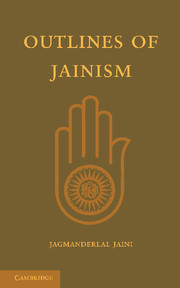PREFACE
Published online by Cambridge University Press: 05 June 2016
Summary
CONTACT between the East and the West is of a comparatively recent date ; but it has already borne fruit. The East has shed its merely contemplative mood, while the West has outlived its merely materialistic tendencies. There is indeed a general willingness to exchange ideas, whereby the whole of humanity is benefiting.
About a century and a half ago there arose in Europe a great desire to explore the buried and current treasures of the East. Among the religions of Indian origin Brahmanism, or Hinduism, was the first to attract attention, but Buddhism soon followed. Jainism, which came last, made its advent in unfavourable circumstances. The Jainas of India were ignorant of the west and o'f western methods of study. Worse than this, they were religiously averse to letting non-Jainas read, or even see or touch, their sacred books. In consequence Jainism was misunderstood and misrepresented. Its tradition and teachings suffered from the scholar's partiality for his older and accustomed studies in Brahmanism and Buddhism. But, by the labours of men like Weber, Biihler, Jacobi, Hoernle, and others, the credibility of its tradition lias been established, and it has been accorded the recognition due to its antiquity and importance. There are also evidences of a more general interest in Jainism as a practical religion. Many persons—Europeans and others—have asked for a small and reliable book on the subject, and not being aware of any work which precisely answers the requirements, I have ventured to put together these Outlines, addressed to a public in India and Europe. The vastness of the subject may help to excuse the inadequacy, of which I am fully conscious. The Outlines were sketched in England in 1908-9, for the purpose of conveying to Brother H. Warren what little I knew of Jainism. Mr. Warren typed his notes, which helped me considerably in preparing the English portion of the book. My friend Brother Jaina-bhushana Brahmachari Sital Pershadji, of Bombay, helped me to select the original texts at Allahabad in 1913. In the same year in London Dr. F. W. Thomas, of the India Office Library and President of the Jaina Literature Society, London, most kindly undertook to help me with the publication of the book
- Type
- Chapter
- Information
- Outlines of Jainism , pp. xii - xvPublisher: Cambridge University PressPrint publication year: 2013



